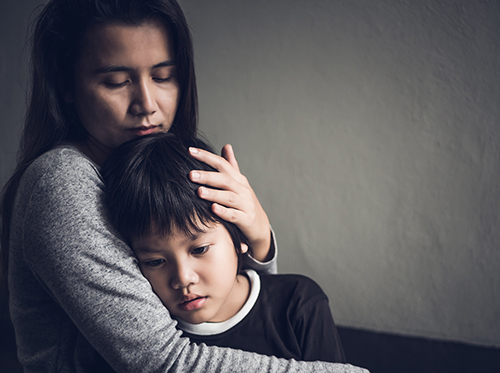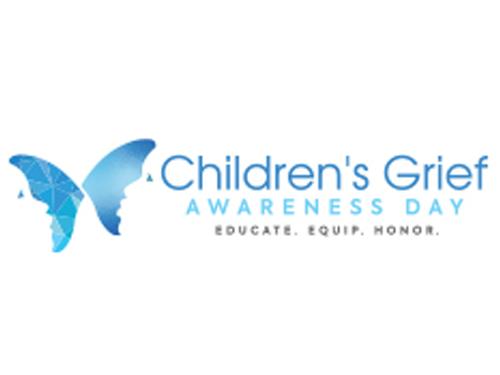How can we help?
888-283-1722
Call us now at 888-283-1722
24/7 Referrals and Nursing Support
Voices of Care Blog

6 Ways to Support Your Child After a Suicide Death
Posted on October 16, 2020 by Sarah BujoldIf someone important in your child’s life died of suicide, what would you tell them? The answer isn’t an easy one.
It’s common for caregivers to struggle when talking to their children about the death of an important person especially when that person died of suicide. Some caregivers may find it challenging to determine how much to share while others might wonder if it’s best not to tell their child how the person died.
Although it can be a difficult conversation to have with a child, at some point they will likely find out more details about the death. Therefore, it is important that they receive honest information from a parent or caregiver whom they trust and who knows how to shape the message.
Here are six tips on how to guide the conversation with your child and suggestions on how to support them after they learn about a death by suicide.
- Provide simple and concrete information. Young children may not understand euphemisms such as the person “passed away” or “is no longer here”. You might start the conversation by saying “something very sad happened last night. Mommy took so many pills to make her body stop working and she died.” Follow your child’s lead and share with them only the information that they want to know.
- Some children may feel that the death happened as a result of something they had done. Reassure them that the death was not their fault. Explain that the person was experiencing so much emotional pain and they thought the only way to end this pain was by dying. Let them know that there are many reasons that can cause a person to have this significant amount of pain and that it was not because the child did not love them enough or that they didn’t love the child enough.
- It is common for people to say the person “committed suicide”; however, the word “committed” implies that the person followed through with a crime or sin. Try to use less shameful language such as “died by suicide” instead.
- Reassure your child that if they ever have additional questions or concerns, they can ask you or another trusted adult. Check in occasionally to see if your child has any questions or wants to talk about the death.
- Model healthy coping skills and use words to identify how you are feeling. For example, “I am feeling really sad that Mommy died. I am going to go for a walk to help myself feel better.” This can help your child learn healthy coping skills and may lessen any concerns they may have about your health.
- Give your child plenty of opportunities to make choices throughout the day. Choices allow children to feel a sense of control, which can be helpful during situations when they feel powerless. If you are comfortable with it, ask if they would like to attend any of the services that follow the person’s death. An opportunity to participate gives children a chance to say goodbye to their loved one.
Here are some resources that provide additional information and activities to help support a child after a suicide death:
Coalition to Support Grieving Students:
https://grievingstudents.org/module-section/suicide/
Suicide Resources from The Dougy Center: https://www.dougy.org/docs/Suicide_Resources_Flier_2018.pdf
Samaritans:
https://www.samaritans.org/
National Alliance for Grieving Children:
https://childrengrieve.org/
Learn about Care Dimensions’ grief support programs for children.
About the author
Sarah Bujold is a Certified Child Life Specialist with Care Dimensions.
Additional Posts
Tips for Caregivers of Grieving Children with Developmental Delays
Posted on January 22, 2026 by Bridget McHallam, Child Life Intern in ChildrenWhen children with developmental delays experience loss, grief can look different. This article explores how children understand death and offers practical ways caregivers can provide comfort and support. ...
Continue readingMemory Making Activities for Children Before and After a Death
Posted on November 17, 2025 by Bridget McHallam, Child Life Specialist Intern in ChildrenFor many children and teenagers, engaging in memory-making activities can be a meaningful way to express love, connection, and remembrance. Here are some suggested activities. ...
Continue readingChildren's Grief Awareness Month: Why it Matters
Posted on October 28, 2025 by Kasey Griffin, MS, CCLS in ChildrenEvery November, we recognize Children’s Grief Awareness Month. Here are some tips on how you can help children who are grieving. ...
Continue readingAnyone—patient, family, care provider—can make a referral. Fill in the form online or call us today.
Since 1978, Care Dimensions, formerly Hospice of the North Shore, has provided comprehensive and compassionate care for individuals and families dealing with life-threatening illnesses. As the non-profit leader in advanced illness care, we offer services in over 100 communities in Massachusetts.
Copyright 2026 | Care Dimensions, 75 Sylvan Street, Suite B-102, Danvers, MA 01923 | 888-283-1722 | 978-774-7566 |









